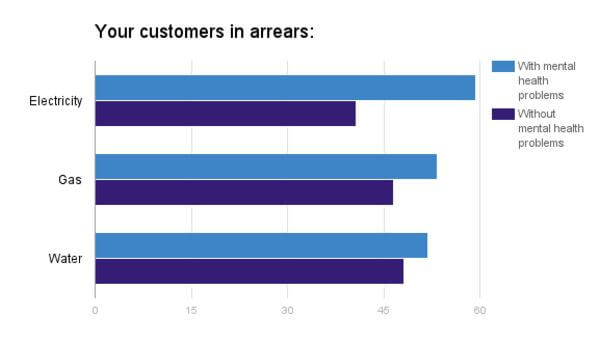
Stick or switch?
Energy switching has hit a six-year high, new figures from Ofgem show today. That’s welcome news, and a sign that more and more consumers are taking control of their energy costs.
But let’s not get too excited: two-thirds of customers are still on standard or pre-pay tariffs – and so paying far more than they need to. And the evidence suggests that consumers with mental health problems are likely to be overrepresented in this group, and struggling with their energy bills as a result.
Take a look at this graph I put together for a workshop with energy providers just before Christmas:

Consumers with mental health problems are so much more likely to bein arrears on their utility bills than those without, that they make up a clear majority of customers who are behind on payments.
Why is this happening?
We know people with mental health problems are much more likely to be living on a low income. But I believe there are other problems with the energy market that compound this low-income problem, and make it particularly difficult for people living with a mental health problem to get a fair deal.
Today we’re publishing a policy note, setting out the main problems our research has identified, and the areas where the energy companies and Ofgem could do more. Consumers have told us time and again how distressing their experiences with energy companies have been:
“It has [caused] me a lot of distress as my electric bill was really high last year and [I was] unable to pay, which then left me in a lot of debt. it sent my emotions out of control which led to me being in a mental health hospital last year.”
“If a utility bill that came in was wrong (and in one particular case, the electric bill), hard as I tried I couldn’t speak confidently enough to get it sorted. I tried explaining how they were in the wrong but I spoke so weakly that they spoke over me.”
“Acute agoraphobia means I’m completely house bound and therefore unable to get any work. This also means I have to pay carers to do shopping get gas and electric on keys and any other tasks that involve going out.”
Problems switching
Our research suggests consumers have a particular challenge when it comes to switching, an invisible problem in Ofgem’s latest data, but a profound one for those who argue switching is the solution to market failure. Periods of poor mental health are often accompanied by lethargy and an inability to concentrate or hold information (such as a comparison between two providers) in mind. This has a dramatic impact on consumers’ ability to switch provider, as two of our consumers told us in research.
“[When unwell] we didn’t change service providers, insurers or haggle … these are things I would do annually under normal circumstances. There just wasn’t the time and I didn’t have the energy to do them.”
“Simply due to exhaustion – switching bank accounts or energy providers, or finding a good savings account require more energy than I have to spare.”
Regulating the market
Energy companies could do more to help, but part of the job has to fall on the regulator, Ofgem. Last week we published our analysis of how the Financial Conduct Authority could improve the way financial markets work, by better supporting consumers with mental health problems. Many of the same lessons apply to Ofgem.
One in four of us has a mental health problem every year – and as the data above shows – that includes the majority of the customers getting into trouble with their energy bills. The difficulties these consumers face are not ‘laziness’ or ‘stupidity’, and they are not barriers that can be simply overcome by willpower. Regulators can’t just push people harder and expect them to overcome cognitive, psychological and medical barriers that prevent them from engaging effectively in the marketplace.
As our report Seeing through the fog set out, we need to explore adaptations that help consumers – like automated switching, or account access for carers – to level the playing field, and ensure an energy crisis or a cold and darkened home are not the inevitable consequences of mental ill health.
You can read the full policy note here